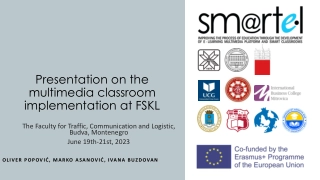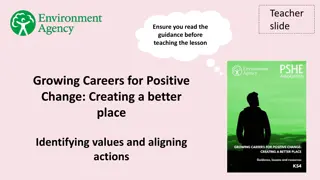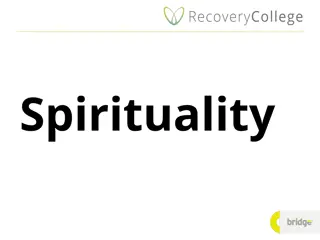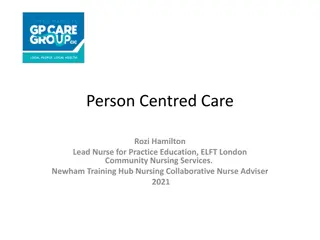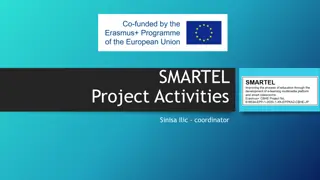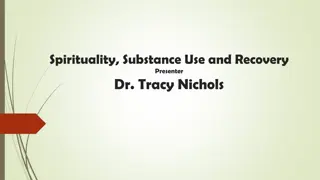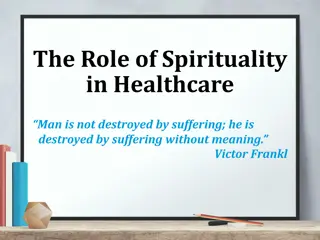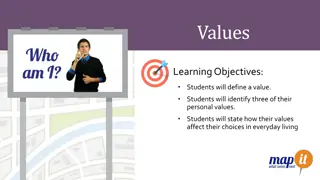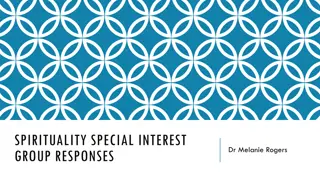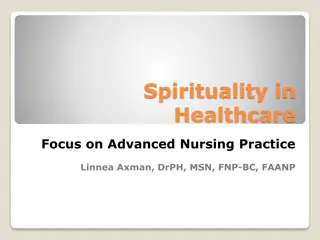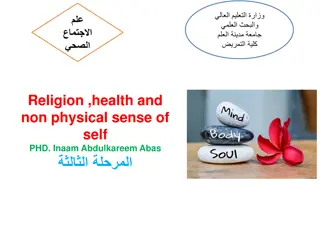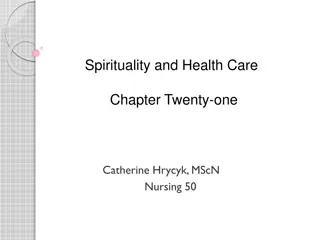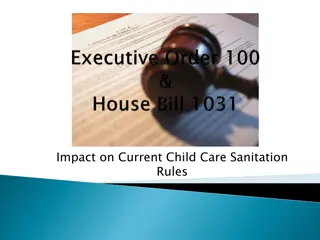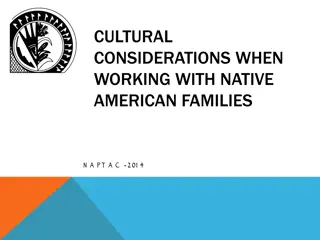Exploring Values and Spirituality in University Classrooms
Exploratory research delves into the incorporation of values and spirituality in university classrooms based on a survey conducted among 59 respondents, showcasing motivations, comments, and support/opposition found among colleagues for such initiatives. The study highlights the significance of addressing students' needs for deeper connections with life, purpose, and meaning in educational settings.
Download Presentation

Please find below an Image/Link to download the presentation.
The content on the website is provided AS IS for your information and personal use only. It may not be sold, licensed, or shared on other websites without obtaining consent from the author.If you encounter any issues during the download, it is possible that the publisher has removed the file from their server.
You are allowed to download the files provided on this website for personal or commercial use, subject to the condition that they are used lawfully. All files are the property of their respective owners.
The content on the website is provided AS IS for your information and personal use only. It may not be sold, licensed, or shared on other websites without obtaining consent from the author.
E N D
Presentation Transcript
Values & Spirituality in University Classrooms: What s Going on Here?
Exploratory Research Survey Follows up PDW at AOM 2015: Faith, Formation & Values Ten Questions - designed to explore commonalities Distributed to MSR Listserv & PDW Participants 59 Respondents 33created a course to address student needs for deeper connection with life 11 created a course they would describe differently 13 did not create a course (but may have addressed similar needs) 44 created or modified a course WHY?
What motivated you to create (modify) the course? (all that apply)
Comments Other Reasons (Summary) Important, often ignored dimension that paves the way to perspective transformation Ultimate values are conditional horizon of thought epistemology Senior executives expressed concern to deepen meaning of work Teaching a course on finding meaning and purpose at work Faith-based institution, this is a natural fit, driven by theology Personal experience of values, spirituality, meaning, purpose Has always been part of my teaching not new w/Millennials
Nineteen Other Reasons - Summary Students need self-awareness, meaning in order to relate to others. Students not knowing themselves, not in touch with their spiritual sides and thus lacking in direction and motivation Lack of sense of serving or caring about others Lack of moral foundation at individual level Shallow belief that consumption will make us happy -- not sustainable Helping people find connections and meaning in work & life Preparing students for complex calling as leaders/change accelerators Lack of attention to these issues at universities; my research area
What support or opposition did you find for your course among colleagues?
Comments/Other - Summary All or most of these! Colleagues wrapped up in own work Once they get feedback from students, colleagues intrigued, surprised Total support from Assoc. Provost and other full professors Both courses strongly supported Support in my own school but hostility in other schools of university
Course part of the Curriculum or Experimental? An Elective or Required? Graduate or Undergrad?
What broad approach did you take? (Maximum of Two)
Other Approaches All of the above Integrating research and writing from religious history, psychology, consumer and management research, business motivation, mindfulness, etc. Identity development Sustainability Alternative perspectives in business Spiritual intelligence + emotional intelligence + eco-literacy + systems intelligence + collaborative action
What seems to resonate most with your students? (Max two)
What Resonates with Students? Topics Clarifying beliefs and values -- understanding world views Becoming mindful of feelings, learning the importance of listening to others and methods of doing it. Emphasis on "Quality of Life" over "Standard of Living" is sustainable; Wholesome vision for self Experiential exercises, meditations, discussions, role-plays Meaningful Work; How will you measure your life? Building community; finding meaning Finding a sense of purpose in business
What Resonates with Students? Books and Exercises Man s Search for Meaning Viktor Frankl Clay Christensen's How Will You Measure Your Life? (x 2) First thing First, Three Truths of Well-Being by Sadguru Jaggi Vasudev Giving Voice to Values, Managing Difficult Interactions, Personal Mission Statements Developing wholesome, purpose-based personal vision statement, Yoga and Meditation
What Resonates with Students? Books and Exercises Continued Vocational exercises, thought experiments 60th Birthday- what will people say about you Cultural perspectives questionnaire from Imd Hierarchy of values and desires Demonstrating that mental entities fall apart when held still in one's mind ("semantic satiation") Short meditation with spiritual reading and discussion at start of EMBA class I design exercises to develop mindfulness, to uncover mental models and paradigms, to slow down and reflect, to engage the right brain hemisphere
What Resonates with Students? Meditation and Mindfulness Meditation or reflection is incorporated in several courses, sometimes daily; e.g., I do a guided mediation as part of a module on stress & overcoming stress - if resources are available I include a yoga session with it. Usually once a semester I do practices based on my research and longtime practice of mindfulness and meditation. I don't think faculty should introduce anything that they do not personally practice and know deeply. Playing a favorite song and displaying how your liking of it varies over the course of the song Insight-based critical realism exercise on capturing 'insight' seems to go over pretty well. Vision Exercise
What Resonates with Students? Journaling and Other Journaling (How used? Graded or voluntary?) Leadership formation journal Learning logs (graded) Other Role plays, story telling, sense of serving Documentaries: Happy; I am The combination of topics, meditation, journaling and action learning
What evidence do you have that your course is making a difference? Check all that apply.
What type of instrument indicates change? Three responses: Moral Foundation Survey and Emotional Intelligence Survey Standardized instruments on mindfulness, compassion, subjective vital energy, engagement, perceived stress Pre/post survey based on National Study of Youth & Religion (Smith & Snell) with control groups and analysis of final essays
Best Practices Rich and varied offerings Too many to cover in detail Grouped by theme - Will touch on one or two Request the power point for detail
Use Experiential Learning & Academic Sources The more experiential, the better. In addition, linking the students experience to credible academic sources helps to reassure the students that this is an authentic experience, particularly in the Business School paradigm Base the course on a broad array of published scientific research and of serious, respected writings, so that the student sees that these are not merely one person's opinions. Also, focusing student evaluation (i.e., grades) on absorbing these readings gives them a good chance of reaching the desired conclusions on their own. Understand how people make value decisions. According to neuroscience decisions are made unconsciously. To teach values one has to understand how to educate the unconscious and integrate it with conscious reasoning. Most faculty do not know how to do this. There is an ethics pedagogy I have developed for this that includes using emotional intelligence exercises, meditation, journaling and case studies. Keep a fine balance between the technical knowledge topics and implications of it from the values/spirituality. Any excess of one of it will lose out the attention of students. Start from technical knowledge and give it a full go then introduce other topics gradually - it helps the students to appreciate the knowledge level of the professor and accept the shortcomings of existing systems.
Take them on a journey Take the students on a journey, as they find it quite a challenge at the beginning. Follow your intuition, but also be aware that it is a lot more work than a conventional course, and that you need to tolerate skepticism from students at the beginning of the course; hence you need to take them on a journey. Think about what your long term goals are for your teaching - what do you want for your students to remember (& use) years from now. Don't be afraid to try things. If students see your purpose, they are open & forgiving if things don't go as you thought they would!
Start Slowly and Adapt to Your Students Design the course while running it. Start slowly - innovate with iterations. Have clearly articulated learning goals and explain the benefits of these learning goals. DO less and do it well. Incorporate reflection and meditation IN THE CLASSROOM EVERY TIME YOU MEET (model what you want them to practice). Start pragmatically and modestly with what is meaningful for people/students and executives in their current work life, ie. the question Vineet Nayar askes (previous CEO HCL Technologies, author of Employees First, Customers Second): "Why are you here?", what are you doing, doing what you do? Integrate this approach into an existing course before creating a fully-fledged course in itself.
Offer Multiple Perspectives Offer up all conflicting sides of an issue. Bring in examples that students can personally relate to. Offer multiple perspectives from a diversity standpoint, include case studies of organizations, and offer a variety of contemplative practices for the student to choose from for practice during the course (A la Andre Delbecq). Differentiate "Quality of Life" from "Standard of Living" and then connect this difference to issues of sustainability. Incorporate what I (and others) call the 3-H approach: head, heart and hands. We can no longer rely on the old-fashioned lecture or head approach. Students must truly be engaged through their heart and actual hands-on experiences.
Bring your passion, but dont preach First work on yourself, being present in the classroom; know your students and what they respond to - in my case, movies/documentaries, and probably experiential cases studies Build on what YOU know, believe, and experience. Include practices for them to do and then write about what they experience. Build in personal projects. DO NOT PREACH a particular path or way or religion: encourage experimentation, experiences, regular practice-- and reflection on it. Practice what we believe and walk the talk. Be sincere with the students; help them to improve. Give them a message of love to humanity.
Stimulate Self-Awareness Introduce the idea that one must first be self-aware and open to self- improvement in order to first better "lead" oneself. Then and only then, can an individual "lead" or interact genuinely with others. In other words, the first step is working on ourselves (values, morals, self-awareness of biases, etc.) then we can more authentically connect with others in relationships characterized by openness and love. Asking them to keep a "Leadership Journal" i.e. something personal, not graded or looked at, but that awakes mindfulness in them. Discuss first with students and help them recognize their spiritual needs and how they influence their business approach.
Reflection and Personal Mission Statement Ask hard questions, encourage reflection, provide rich inputs, provide non-judgmental feedback -- insist on well-defined personal mission statement to bring it all together. Structure student reflection based on a broad definition of "vocation Developing wholesome vision for self, Photo voice exercise, Making mind maps, Yoga and Meditation Invite students to develop a personal scenario/vision statement for their life based on their espoused values. Use a 5-10 year time-frame to prompt their thinking. If you could "have it your way" what would your life look like in 10 years? Visioneering" exercise to model it.
Insight I've found that taking the time early on to share recognition of the principles of insight, and a guided exploration into insight- based critical realism offers a basis, a foundation, upon which much can be done. The "epistemological theorum" of Lonergan is a very beguiling set of words to let students ponder. The notion that ontology is empirically responsive to our highest yearnings for meaning, not just the positivist measurables, tends to catch students by surprise, if they are given the time and opportunity to discuss the matter until they 'get it': insight. Perhaps emphasize that spirit and soul are not something we put into work, but something that resides there naturally as part of our human experience - the question becomes, then, how we honor and nurture that spirit and soul vs how we restrict or retard that via the ways in which we organize and conduct work.
Appreciation Exercise I had students, most of whom were working adults, experiment with doing "appreciation" for other(s) in their workplace and describe results in written form plus some class discussion on these. For students not working, they were asked to do the same with family or friends. Some students find this very meaningful (and students also each had a student colleague as mentor and another as mentee), others were not much moved. Participate in the Collaboratory - a Learning Lab set up for this purpose. It is a United Nations PRME Working Group on the Sustainability Mindset and participation is free
Getting to Yes Test the course as "experimental"; examine the student draw (interest); present to curriculum committee and HOPE! Try to involve other faculty. Visit with those who have developed a robust pedagogy inclusive of meditation, reflection/journaling, and action learning


